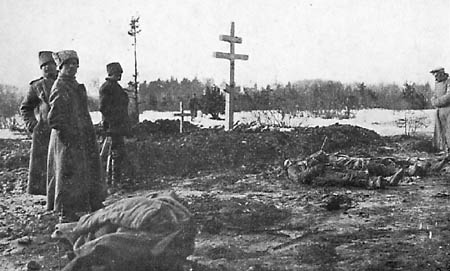

CHAPTER XXIII
THE GAS ATTACK
At five o'clock on the morning of the ninth of September, 1916, the wind was coming gently from the German lines toward ours with a scarcely perceptible movement. Metia and I were sleeping in our dug-out about three hundred yards back of the first-line trenches.
I was awakened by the sound of a heavy bombardment from our artillery and the screeching and sharp explosions of German shells landing near our dug-out. I aroused Metia and proceeded to get ready to go down to the trenches to find out what was up. I slipped my gas-mask over my shoulder as I threw on my clothes, although while it was a rule that officers and soldiers should always wear gas-masks when within two miles of the trenches, we were all rather careless in that respect. Indeed, we frequently found upon examining the soldiers' masks that the box containing the chemicals designed to neutralize the gas had been emptied and contained instead tobacco, bread, or similar articles! Our corps had never experienced a really severe gas attack and our carelessness was more or less natural.

Fig. 25. The dead
laid in rows after the gas attack. They covered half an acre. Note the white
spots over the mouths. Poisoning by gas causes a greenish white froth to
exude from the victim's mouth after death. (This is included as a protest
against the barbarous methods of killing introduced by the Germans.)
As Metia and I approached the trenches, I saw ahead what looked to be a swirling bank of fog rolling down on us. It was only about fifty feet high and it crept slowly and heavily, seeming to flow along the surface of the earth with a hideous writhing motion.
I realized immediately what it was and shouted to Metia to put on his gas-mask, proceeding at the same time to slip my own on. If you don't get the mask on before you get a lungful of gas, it is usually fatal. I had just got my mask into place when I was surrounded by the flying wreaths of the yellow vapor and I heard an awful cry and a violent coughing and choking back of me. I turned and saw Metia on the ground, writhing like a chicken with its head off. I ran back to him ,and tried to lift him from the ground and get him back out of the gas, but it was too late! So dense was the mass of vapor that in five minutes after he took the first breath of the vile stuff, he was dead! He had come off without his mask and in the excitement and darkness I had not noticed its absence.
There was nothing to do for the poor boy and I left him and continued down to the first line. Not a single rifle shot was being fired and I wondered whether all our men had been gassed.
When I reached the trenches the upper air was growing pure, but the gas still clung to the bottom of the trenches, and in the bomb-proofs it was very dense.
The sight that met my eyes in the trenches, I shall never forget.
Dozens of men were lying about in the bottom of the trenches. Most of them were dead but a few were still choking and breathing with horrid rattling gasps. As I flashed my lantern on their contorted faces I saw that from every mouth exuded a great heaped-up pile of greenish-white froth. With the help of my orderlies we proceeded to drag these poor wretches out of the holes where they had perished like rats in a trap.

Fig. 26. Large
bomb-proof used as a dressing station and small bomb-proof in foreground
where the author lived during the winter of 1916-1917. Here he was sleeping
when the Germans launched the gas attack which killed 2,000 men in this
particular sector.

Fig. 27. Burial
of the dead after the gas attack. Rude wooden crosses mark the graves.
As we worked, a second and third wave of gas passed over us, and following each wave the Germans attacked. Fortunately the attacks were weak and scattered and our machine-gun men, who had been able to get their masks on in time, broke them up with comparative ease.
In that small sector, the deadly fumes killed no less than two thousand of our men. The stuff penetrated to a distance of some ten miles in the rear of our lines, following the low ground, like a river flowing through a valley, and at this great distance killed some cows and horses in a field.
There was not much to do for the chaps who had been slightly gassed. The two hundred whom we succeeded in getting out alive suffered intense agony at every breath, but we quieted them with morphine and sent them back in the ambulances to the division hospital.
By ten o'clock fresh regiments had replaced the one which had been wiped out, and the two thousand dead bodies were carried back to the cemetery in back of the lines, where they were placed row after row, covering half an acre of ground. Poor Metia was buried with the rest of them.
Chapter Twenty-Four: The Revolution.